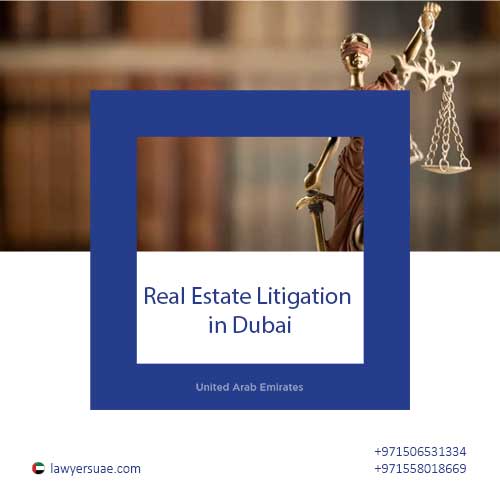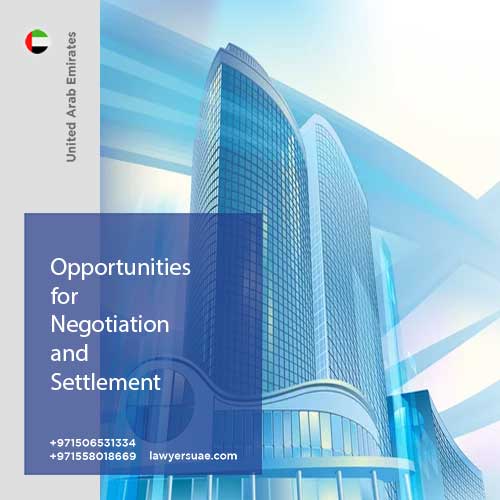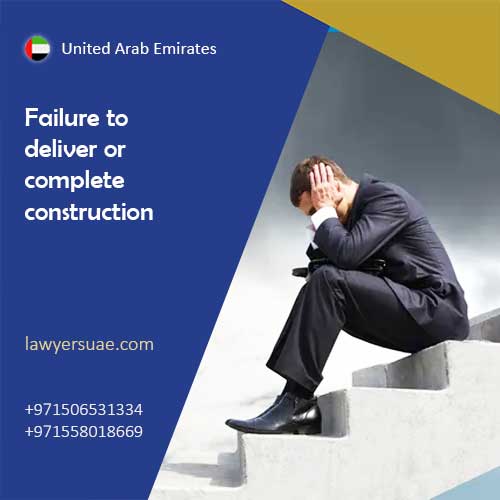Understanding Real Estate Litigation in Dubai
Dubai’s real estate landscape is a dynamic and lucrative market, but it’s not without its share of challenges. One of the most critical aspects of thriving in this market is understanding real estate litigation. In this comprehensive guide, we will delve into the intricacies of real estate litigation in Dubai, equipping you with the knowledge you need to navigate this complex terrain.
What is Real Estate Litigation?
Real estate litigation is the legal process of resolving disputes related to property transactions, ownership, and other real estate matters through the judicial system. It is essential for protecting your property interests and ensuring that your rights are upheld.
Types of Real Estate Disputes in Dubai
Dubai’s real estate sector witnesses various types of disputes, including:
- Non-payment of rent or purchase price: Instances where tenants fail to pay rent or buyers default on property payments.
- Failure to deliver or complete construction: Cases where developers do not fulfill their commitments regarding property completion.
- Defects in property: Disputes arising from structural or other property defects.
- Termination of lease agreements: Legal issues surrounding lease contract terminations.
Examples of Common Cases
To illustrate the real-world impact of real estate litigation, here are some common scenarios:
- Breach of Contract: A developer fails to deliver a property as agreed, leading to a breach of contract dispute. A Property Dispute lawyer can provide guidance on the breach of contract.
- Title Disputes: A property’s ownership is contested due to forgery or fraudulent transactions.
- Landlord-Tenant Disputes: A tenant refuses to vacate a property, sparking eviction-related legal action.
- Construction Disputes: A construction project is delayed due to contractual disagreements between parties.
Legal Framework for Real Estate in Dubai
Understanding the legal framework is crucial in real estate litigation. Key aspects include:
Overview of Key Laws and Regulations
- Federal laws: Governing real estate transactions across the UAE.
- Local regulations: Dubai-specific or Abu Dhabi-specific regulations and guidelines.
- Role of Dubai Land Department (DLD): The DLD is a central authority regulating property transactions in Dubai.
Relevant Courts and Tribunals
Legal disputes in Dubai’s real estate sector are typically addressed by:
- Dubai Courts: Handling a wide range of cases.
- Dubai International Financial Centre (DIFC) Courts: Specializing in financial and commercial disputes.
- Arbitration: ADR methods commonly used to resolve real estate disputes.
Stages of a Real Estate Litigation Case
Navigating real estate litigation involves several stages:
Pre-Litigation Steps: Negotiation and Mediation
- Before going to court, parties often attempt to resolve disputes through negotiation or mediation. Weighing litigation v. arbitration pros and cons guides the approach.
Filing a Lawsuit
- If no resolution is reached, the next step is filing a lawsuit with the appropriate court.
Discovery and Evidence Gathering
- Parties collect evidence to support their claims, including documents and witness statements.
Trial and Judgment
- The case goes to trial, where arguments are presented, and a judgment is issued.
Enforcement of the Judgment
- Finally, the winning party must enforce the court’s judgment.
In the next section, we will explore the common issues that lead to real estate litigation in Dubai. Understanding these issues is essential for both property buyers and developers.
Common Issues Leading to Litigation
In the bustling Dubai real estate market, disputes can arise from various quarters, putting property owners, tenants, and developers in precarious positions. In this section, we will explore the most common issues that frequently lead to real estate litigation in Dubai.
Breach of Contract
Non-payment of rent or purchase price: One of the most common issues involves buyer’s breach of contract in real estate deals, such as when purchasers default on making property purchase payments or tenants failing to pay their rent. This breach of contract can trigger legal actions, leaving both parties embroiled in litigation.
Failure to deliver or complete construction: Developers often promise specific delivery dates and property specifications. When they fail to fulfill these commitments, disputes regarding breach of contract ensue.
Defects in property: Disputes may arise when property purchasers discover structural defects or other issues that were not disclosed during the transaction, leading to a breach of contract claim.
Termination of lease agreements: Legal conflicts may arise when landlords or tenants terminate lease agreements, especially if the terms of termination are disputed.
Title Disputes
Ownership claims and disputes: In Dubai’s real estate market, disputes can arise over property ownership, with multiple parties claiming rights to the same property.
Forgery and fraudulent transactions: Cases of forged documents or fraudulent transactions can lead to complex legal battles to determine true property ownership.
Encumbrances and restrictions on title: Title disputes may also revolve around encumbrances and restrictions that affect the property’s marketability or use.
Landlord-Tenant Disputes
Unfair lease terms: Landlords may insert unfair terms in lease agreements, such as unreasonable rent increases or restrictions that infringe upon tenant rights.
Eviction notices and procedures: Landlords may issue eviction notices that tenants consider unjust, leading to disputes over eviction procedures.
Rent disputes and security deposit issues: Disagreements over rent payments and security deposit returns can escalate into legal conflicts between landlords and tenants.
Maintenance and repair responsibilities: Conflicts may arise when tenants expect landlords to address maintenance and repair issues promptly.
Construction Disputes
Delays and contractual disagreements: Construction projects often face delays due to unforeseen circumstances or contractual disagreements between parties involved.
Defective workmanship and non-compliance with specifications: Disputes can erupt when construction work does not meet agreed-upon specifications or standards.
Payment disputes between contractors and developers: Contractors may take legal action against developers for non-payment, while developers may dispute the quality or timeliness of work.
Architect and engineer negligence: Negligence on the part of architects and engineers can result in disputes over substandard construction or design issues.
Understanding these common issues is crucial for anyone involved in Dubai’s real estate market. In the next section, we will explore the steps you can take to seek legal counsel and take action when facing these challenges.
Seeking Legal Counsel and Taking Action
When facing real estate disputes in Dubai, securing the right legal representation is often the key to a successful outcome. In this section, we will explore the crucial steps involved in seeking legal counsel and preparing for real estate litigation.
Finding the Right Real Estate Lawyer
The first step in addressing real estate litigation is to find a qualified and experienced real estate lawyer who can advocate for your interests effectively. Consider the following factors when choosing a lawyer:
Experience and Expertise in Dubai Real Estate Law
- Look for a lawyer who specializes in Dubai’s unique real estate laws and regulations. Local expertise is invaluable when navigating the complexities of the Dubai property market.
Fees and Costs Associated with Legal Representation
- Discuss fees and costs upfront to ensure transparency and avoid financial surprises. Understand the lawyer’s billing structure and payment terms.
Preparing for Litigation
Before entering into a legal battle, thorough preparation is essential. Here’s how you can get ready for real estate litigation:
Gathering Evidence and Documentation
- Collect all relevant documents, including contracts, agreements, correspondence, and any evidence that supports your case. Well-organized documentation can be a powerful asset during litigation.
Witness Statements and Expert Reports
- Identify potential witnesses who can testify on your behalf. Additionally, consult with experts, such as property appraisers or construction specialists, who can provide valuable insights.
Understanding the Litigation Process and Potential Outcomes
- Your lawyer should explain the litigation process, including timelines and potential outcomes. Understanding what to expect can help you make informed decisions throughout the case.
Strategies for Success
In the realm of real estate litigation, several strategies can lead to favorable outcomes. Consider the following:
Negotiation and Settlement Options
- Explore opportunities for negotiation and settlement with the opposing party. Amicable resolutions can save time and money while preserving relationships.
Alternative Dispute Resolution (ADR)
- ADR methods like mediation or arbitration can provide a less adversarial and more efficient way to resolve disputes compared to full-blown court proceedings.
Court Proceedings and Litigation Strategies
- If negotiations and ADR do not yield results, your lawyer will guide you through court proceedings, employing litigation strategies tailored to your case.
Financial Considerations of Litigation
Real estate litigation often comes with financial implications. Be prepared for the following financial aspects:
Legal Fees and Court Costs
- Understand the legal fees associated with your case, including attorney fees and court filing fees. Budget accordingly.
Expert Witness Fees and Other Expenses
- Depending on the complexity of your case, you may need to enlist expert witnesses, whose fees should be factored into your budget.
Potential Damages and Compensation
- Consider the potential damages and compensation you may be entitled to if your case is successful. This should inform your overall litigation strategy.
Armed with a solid understanding of how to seek legal counsel, prepare for litigation, and adopt effective strategies, you are better equipped to navigate the complexities of real estate disputes in Dubai. In the next section, we will explore essential measures to protect yourself from real estate litigation by practicing due diligence and research.
Protecting Yourself from Real Estate Litigation
In the dynamic world of Dubai’s real estate, avoiding litigation is often preferable to going through the complex legal process. To minimize the risk of ending up in a courtroom, it’s essential to adopt proactive measures for protection. In this section, we’ll explore strategies to safeguard yourself from real estate litigation in Dubai.
Due Diligence and Research
Verifying Property Ownership and Title: Before making any real estate transaction, conduct thorough research to verify property ownership and title. This step helps ensure that the property’s seller has the legal right to transfer ownership.
Reviewing Contracts Carefully: Carefully review all contracts and agreements related to the property transaction. Pay close attention to terms and conditions, including deadlines, payment schedules, and responsibilities.
Obtaining Professional Advice and Inspections: Engage professionals, such as real estate agents, lawyers, and property inspectors, to assist you in making informed decisions. Their expertise can uncover potential red flags and hidden issues.
Clear and Transparent Agreements
Drafting Comprehensive and Unambiguous Contracts: When drafting contracts, ensure they are comprehensive, clear, and unambiguous. Ambiguities can lead to disputes down the line, so it’s crucial to define terms and responsibilities clearly.
Addressing All Potential Issues and Contingencies: Anticipate potential issues and contingencies in your contracts. Address matters like dispute resolution mechanisms, penalties for breaches, and timelines for performance.
Clear Communication and Documentation: Maintain clear and transparent communication throughout the transaction. Document all communications in writing, including emails and letters, to create a paper trail in case disputes arise.
Dispute Resolution Clauses
Including Mediation or Arbitration Clauses: Consider including mediation or arbitration clauses in your contracts. These clauses can provide alternative dispute resolution methods that are often faster and less costly than going to court.
Avoiding Unnecessary Litigation Costs and Delays: By committing to resolving disputes through mediation or arbitration, you can avoid the time-consuming and expensive process of traditional litigation.
Seeking Early Resolution of Disagreements: When conflicts arise, address them promptly. Early intervention can prevent minor disputes from escalating into full-blown litigation.
By proactively implementing due diligence, transparent agreements, and dispute resolution clauses, you can significantly reduce the risk of real estate litigation in Dubai. However, it’s important to remember that even with these precautions, disputes can still occur. In such cases, knowing how to navigate the legal landscape becomes crucial.
In the next section, we will provide you with essential resources and information to help you understand and access the necessary tools and guidance for real estate litigation in Dubai.
Resources and Additional Information
As we conclude this comprehensive guide to real estate litigation in Dubai, it’s essential to equip you with valuable resources and additional information to navigate the complex world of property disputes effectively. Below, you’ll find a wealth of tools and answers to frequently asked questions about real estate litigation in Dubai.
List of Relevant Laws and Regulations
Dubai’s real estate sector operates under various laws and regulations. Familiarize yourself with these key legal references:
- Federal Laws: Explore federal laws that govern real estate transactions across the UAE, ensuring you understand the overarching legal framework.
- Local Regulations: Dive into Dubai-specific regulations and guidelines that apply to property transactions within the emirate.
Contact Information for Dubai Land Department (DLD)
The Dubai Land Department (DLD) plays a pivotal role in regulating and overseeing real estate matters. Reach out to them for inquiries or assistance:
- DLD Website: Visit the official website of the DLD to access a wealth of information, including property ownership verification and legal guidelines.
- Contact Details: Find the contact information for the DLD, including phone numbers and email addresses, to get in touch with their team directly.
Court Websites and Online Resources
Dubai’s legal system involves various courts and tribunals. Access their official websites and online resources for crucial insights:
- Dubai Courts: Explore the official Dubai Courts website to access court forms, legal guides, and contact information for various divisions.
- Dubai International Financial Centre (DIFC) Courts: For financial and commercial disputes, the DIFC Courts offer comprehensive online resources and support.
Directories of Real Estate Lawyers in Dubai
Choosing the right legal representation is essential. Utilize directories to find experienced real estate lawyers in Dubai:
- Legal Directories: Consult online legal directories that provide comprehensive listings of real estate lawyers, complete with their areas of expertise and contact details.
- Recommendations: Seek recommendations from peers or industry experts to identify reputable lawyers with a track record of success in real estate litigation.
FAQs About Real Estate Litigation in Dubai
To address your burning questions about real estate litigation, here are answers to some frequently asked questions:
Q1: What is the typical duration of a real estate litigation case in Dubai?
A1: The duration of a real estate litigation case in Dubai can vary widely depending on the complexity of the case, court workload, and the parties involved. Some cases may resolve within months, while others can take several years.
Q2: Are there any alternative dispute resolution methods available for real estate disputes in Dubai?
A2: Yes, Dubai offers alternative dispute resolution (ADR) methods like mediation and arbitration, which can provide faster and less costly ways to resolve real estate disputes outside of court.
Q3: What are the potential outcomes of a real estate litigation case in Dubai?
A3: Potential outcomes include monetary damages, property ownership adjustments, injunctions, and various other remedies determined by the court.
Q4: How can I verify property ownership and title in Dubai?
A4: The Dubai Land Department (DLD) provides services for verifying property ownership and title. You can access this information through their official channels.
Q5: What are the advantages of including mediation or arbitration clauses in real estate contracts?
A5: Including mediation or arbitration clauses in contracts can lead to quicker and more cost-effective dispute resolutions, reducing the burden of lengthy court proceedings.
Conclusion
In this comprehensive guide to real estate litigation in Dubai, we’ve explored the intricacies of understanding, addressing, and preventing property-related disputes. From the definition of real estate litigation to the protection strategies you can employ, we’ve covered it all.
To recap, our guide encompassed five sections:
- Understanding Real Estate Litigation in Dubai: This section introduced you to the fundamentals of real estate litigation, including types of disputes and common cases.
- Common Issues Leading to Litigation: We delved into the prevalent issues that often result in real estate disputes, from breach of contract to construction disagreements.
- Seeking Legal Counsel and Taking Action: This section provided guidance on finding the right real estate lawyer, preparing for litigation, and adopting successful strategies.
- Protecting Yourself from Real Estate Litigation: We explored proactive measures such as due diligence, clear agreements, and dispute resolution clauses to minimize litigation risks.
- Resources and Additional Information: In this final section, we’ve equipped you with essential resources, contact information, and answers to frequently asked questions to navigate Dubai’s real estate minefield.
Armed with this knowledge and these resources, you are better prepared to tackle the complexities of real estate litigation in Dubai. Whether you are a property owner, tenant, developer, or investor, understanding the legal landscape is essential for success in this vibrant real estate market.





